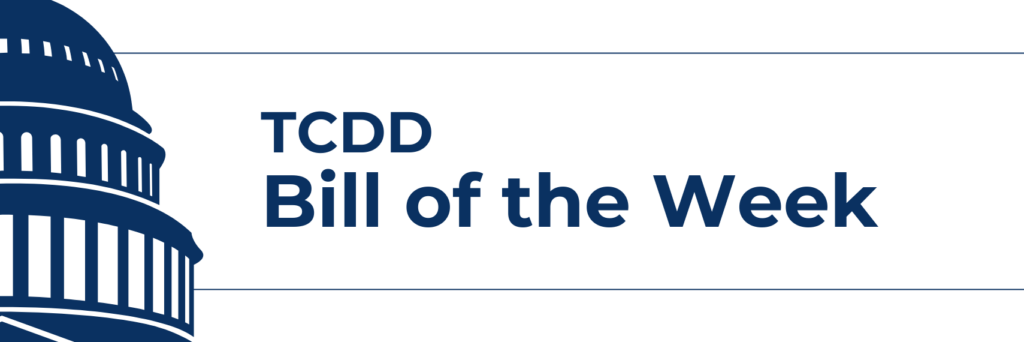
Table of Contents
For this weekly feature, the Texas Council for Developmental Disabilities (TCDD) profiles a noteworthy bill going through the legislative process. The bill may relate directly to TCDD’s Public Policy Priorities or another disability-related issue.
Bill of the Week: HB 3834
House Bill (HB) 3834, relating to the provision of services by the Texas Department of Criminal Justice (TDCJ) to offenders with intellectual or developmental disabilities (IDD). HB 3834 was authored by Rep. Joe Moody from El Paso, District 78.
Share This Bill
We’ve created a Bill of the Week one-pager (PDF) for HB 3834. This is a simplified explanation of the bill that you can share with your representative and personal network.
Background
People with IDD are disproportionately represented in the U.S. criminal justice system. While people with disabilities make up roughly 15% of the general population, approximately 40% of individuals in state prisons report having a disability. Around 24% of prisoners report cognitive or intellectual disabilities such as Down syndrome, autism, or learning disorders. Advocates argue this disparity underscores a systemic failure to support people with IDD before, during, and after incarceration.
Misunderstood and Mistreated (PDF, 19 pages, 6.2 MB), a 2020 report by The Arc of Texas and the Texas Criminal Justice Coalition, detailed widespread shortcomings in how the state’s criminal legal system addresses the needs of individuals with IDD. The report points to a lack of accommodations, services, and appropriate interventions. The challenges do not end upon release. Individuals with IDD face significant barriers to successful reentry into society, including limited access to stable housing, employment opportunities, and health care.
These gaps are especially concerning given that significant numbers of adults with IDD also have a co-occurring mental health condition (PDF, 8 pages, 3.4 MB), increasing their vulnerability and the complexity of their needs. Although reentry programs exist, they are often not designed with IDD populations in mind, leading to inadequate preparation for life after incarceration. As a result, people with IDD face heightened risks of reoffending. One study shows that a diagnosis of intellectual disabilities increases the likelihood of reoffending by 176%.
In 2015, HB 2189 established the Developmentally Disabled Offender Program for individuals who may have an intellectual disability or borderline intellectual functioning, and whose adaptive functioning is significantly impaired. Under the program, TDCJ is required to provide such offenders with a safe environment while confined, in addition to specialized programs, treatments, and activities. The program is designed to assist offenders in effectively managing, treating, or accommodating their intellectual disability or borderline intellectual functioning.
What does the bill do?
HB 3834 would amend the Texas Government Code to rename TDCJ’s Developmentally Disabled Offender Program to the Offenders with Intellectual or Developmental Disabilities Program. The bill expands the program to require TDCJ to develop and identify community resources to assist offenders with intellectual disabilities in successfully reentering and reintegrating into the community.
Additionally, TDCJ would be required to develop and implement a reentry and reintegration plan that is person-centered and based on the individual needs of an offender with intellectual disabilities. The plan may include coordinating treatment, identifying housing assistance, and delivering other transitional services.
The bill specifies that appropriated funds may not be used to provide housing assistance to individuals convicted of certain high-level offenses, such as murder, aggravated robbery, sexual assault, and others.
If enacted, HB 3834 would take effect on Sept. 1, 2025.

“No program exists to connect exiting offenders [with IDD] with community resources for reentry, where they will typically face all the obstacles anyone leaving prison does, plus a whole lot of other obstacles because of their disability. House Bill 3834 makes that necessary change.”
Rep. Joe Moody, HB 3834 author
Where is the bill in the process?
On April 9, 2025, HB 3834 received a public hearing before the House Committee on Corrections and was left pending. When a bill is left pending, it means that the committee did not vote on the bill, and it may be considered again at a future committee meeting. You can watch the discussion on it here, beginning at the 1:09:10 mark.
Who supports the bill and why?
The following comments were provided at the April 9 hearing on HB 3834:
- The Arc of Texas: Kate Stoops, the public policy and advocacy assistant for The Arc of Texas, testified in support of HB 3834. She acknowledged that individuals with IDD are overrepresented in the criminal legal system but emphasized that the disproportionate rate is not because they are more likely to commit crimes. Instead, systemic barriers increase people with IDD’s risk of involvement. Stoops indicated that “these barriers include inadequate access to services, communication challenges, limited understanding of legal rights, and increased vulnerability during interactions with law enforcement and the courts.” She further stated that, “once in the system, individuals with IDD are more likely to face exploitation, isolation, and a lack of appropriate support.”
Stoops complimented the bill’s plan to build on current law by requiring individualized reentry plans that address housing, treatment, and community-based support. She noted that without these supports, people with IDD are at greater risk of homelessness, poor health, and recidivism. In closing, Stoops stated: “HB 3834 ensures that the transition from incarceration is not an afterthought but a coordinated, supportive process that promotes independence and dignity.”
- Advocate: Marsha Harris, who identified herself as a semi-retired small business owner, submitted online comments in favor of HB 3834. She pointed to TDCJ’s mission to house persons convicted of a crime, and also “to rehabilitate these persons so that upon release they are not a threat to the community they are released into.” Lauding the bill’s provisions, Harris stated: “We have to be proactive in creating resources for our Texas people, and part of this is assisting persons coming out of prison and effectively helping them transition so we do have public safety.”
The following groups also registered their support for the bill but provided no testimony: Bexar County Commissioners Court, Coalition of Texans with Disabilities, Conference of Urban Counties, County Judges and Commissioners Association of Texas, Dallas County, Harris County Commissioners Court, Texas Council of Community Centers, NAMI Texas, Texas Appleseed, Texas Association of Goodwills, and Texas Civil Rights Project.
Who opposes the bill and why?
There was no registered opposition to the bill.
Additional Information
Informed by the values identified in the federal Developmental Disabilities Assistance and Bill of Rights Act, TCDD Council Members have adopted the following position statement:
Criminal Justice
TCDD supports the position that people with developmental disabilities – whether as victims, suspects, or witnesses of a crime – have the right to impartial justice, fair treatment, and reasonable accommodations in all areas of the criminal justice system.
How much will the bill cost?
The Legislative Budget Board (PDF) found that HB 3834 would not impact the state budget in a significant way.
Is there a Senate companion to the bill?
Senate Bill 828, by Sen. Tan Parker, is identical to HB 3834. The bill has been referred to the Senate Committee on Criminal Justice, but no further action has been taken on it.
Stay Informed
For the latest information on the status of HB 3834, follow the bill on the Texas Legislature Online. To receive future legislative updates from TCDD, follow us on Facebook, X, Instagram, and LinkedIn.
Bill of the Week Updates
Here is an update on previous TCDD Bills of the Week for the 89th legislative session.
HB 1041 was passed by the House on April 22, and now heads to the Senate for consideration. It would prohibit paid caregivers from serving as beneficiaries of life insurance policies for individuals under their care.
HB 1188, which would require school districts to submit local intellectual and developmental disability authority (LIDDA) referrals for each special education student with IDD, was passed by the House on April 24. It now heads to the Senate for consideration.
HB 1941 received a public hearing by the House Human Services Committee on April 22. The bill, which would establish peer support for individuals with IDD as a billable service under Medicaid, was left pending.
HB 2081 was favorably passed by the House Committee on Higher Education on April 22. The bill now awaits scheduling for consideration by the full Texas House. It would establish the Building Better Futures Program for students with IDD.
